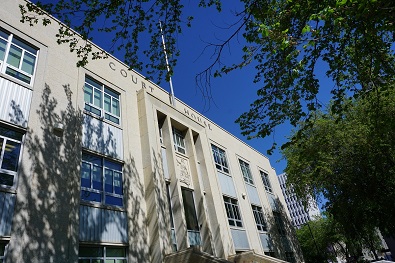Saskatoon Court of Queen’s Bench. Photo by Chelsea Laskowski.
A federal judge has reserved his decision on whether a number of regulations introduced in the months before the Lac La Ronge Indian Band election were within the band’s power to enact.
This comes after a series of injunction applications were filed starting in early March. They sought to keep the band’s Chief Electoral Officer from disqualifying potential candidates in the upcoming nominations and to keep the band’s March 31 election from proceeding as planned.
Issues with the applications and scheduling delays kept the federal court from hearing arguments prior to the election, with the crux of the matter revolving around controversial regulations passed by Band Council Resolution in February. The regulations prevent people who owe money to the band from running.
Arguments were finally heard in a federal court special hearing in Saskatoon on Wednesday, where lawyer Loretta Pete Lambert did not seek to overturn the election results.
Instead, she requested a remedy that is “reasonable and fair,” saying having the new candidate criteria introduced right before an election is “absolutely unfair” and that arbitrary changes do cause hardship. Among those who filed affidavits were Henrie McKenzie, David Ratt, Thomas Ratt, and Keith Olsen.
“There has to be a remedy to these individuals who have been disenfranchised as a result of being disqualified,” Pete Lambert said in court. McKenzie is among the potential candidates who have spoken out publicly against the regulation changes.
Judge Michael D. Manson previously interjected in one of Pete Lambert’s arguments relating to Olsen, saying there was no direct evidence that Olsen’s nominated candidate was disqualified.
The key arguments which Manson’s written decision will address revolve around whether the regulations, passed under the band’s custom election act, are in keeping with federal law.
“The court has the absolute power to decide whether or not the regulations are overreaching or extend into a territory they shouldn’t,” LLRIB lawyer Peter Abrametz Sr. said.
Abrametz argued in court that the changes were followed in accordance with the rights laid out in the Indian Act and the custom election act.
Pete Lambert disagreed, saying election-related regulations are limited to administrative matters because the election act already addresses candidacy matters.
“The regulations cannot substantively affect an aspect in the act, and I think that’s the biggest point here,” she said in court.
She said if the regulations affect the candidacy of a person, “you are going into an arena that those regulations should not be in and we believe those regulations should be struck and should be void.”
Abrametz said while the eventual ruling will have no bearing on who leads LLRIB now, it will guide how things are run in the band’s 2020 election and all elections that follow.
